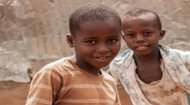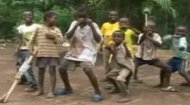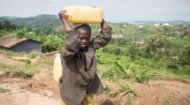Yet, despite this immense variety, there are common threads that weave through the fabric of childhood across the continent, shaping generations with remarkable resilience, strong communal bonds, and an indomitable spirit. For most African children, life begins within an extended family and a close-knit community. Unlike many Western societies where the nuclear family is dominant, the concept of "family" in Africa often encompasses grandparents, aunts, uncles, cousins, and even close family friends. Children are raised collectively, with multiple adults playing a role in their upbringing, instilling values, sharing wisdom, and providing a safety net of support. This communal rearing fosters a strong sense of belonging, interdependence, and shared responsibility from a very young age. Playmates are often siblings and cousins, and outdoor activities dominate, connecting children with their natural environment and immediate surroundings. Children are raised collectively, with multiple adults playing a role in their upbringing, instilling values, sharing wisdom, and providing a safety net of support. This communal rearing fosters a strong sense of belonging, interdependence, and shared responsibility from a very young age. Playmates are often siblings and cousins, and outdoor activities dominate, connecting children with their natural environment and immediate surroundings.
From early childhood, many African children learn the rhythms of daily life and their integral role within the household and community. While play is an essential part of growing up, children, particularly in rural areas, often contribute meaningfully to household chores and family livelihoods. This can involve fetching water from a communal well, often travelling significant distances with buckets balanced on their heads; gathering firewood; tending to younger siblings; or assisting with farming tasks like planting, weeding, or herding livestock. These responsibilities are not seen as burdens but as vital contributions that teach practical skills, foster a strong work ethic, and build a sense of purpose and belonging. In urban settings, daily life might involve assisting with family businesses, hawking goods, or running errands, albeit with different challenges and opportunities.
Education is universally recognised as a powerful tool for upward mobility and a brighter future, and African parents often make immense sacrifices to send their children to school. However, access to quality education remains a significant challenge for many. Schools in remote areas may be sparsely equipped, lacking textbooks, qualified teachers, or even basic sanitation facilities. Distances to school can be vast, requiring long walks under harsh sun or through challenging terrains. Despite these hurdles, the desire for knowledge is strong. Children often overcome incredible obstacles to attend classes, eager to learn to read, write, and acquire skills that could transform their lives and contribute to their families and nations. Beyond formal schooling, children learn invaluable life skills through apprenticeships, oral traditions, storytelling, and observing the adults around them, absorbing cultural norms, history, and practical wisdom passed down through generations.
 Amidst responsibilities and educational pursuits, play remains a vibrant and essential aspect of an African child’s life. Often, toys are handmade from recycled materials – cars from wire, dolls from fabric scraps. Traditional games, songs, and dances, rich in cultural significance, are central to their upbringing. Storytelling around a fire, often involving fables, myths, and historical accounts, teaches moral lessons and connects children to their heritage. Music and dance are interwoven into daily life, celebrations, and rituals, providing powerful forms of expression and communal bonding. These cultural practices instill a strong sense of identity, pride, and continuity with their ancestors. Amidst responsibilities and educational pursuits, play remains a vibrant and essential aspect of an African child’s life. Often, toys are handmade from recycled materials – cars from wire, dolls from fabric scraps. Traditional games, songs, and dances, rich in cultural significance, are central to their upbringing. Storytelling around a fire, often involving fables, myths, and historical accounts, teaches moral lessons and connects children to their heritage. Music and dance are interwoven into daily life, celebrations, and rituals, providing powerful forms of expression and communal bonding. These cultural practices instill a strong sense of identity, pride, and continuity with their ancestors.
The life of an African child is often fraught with complex challenges. Poverty remains a pervasive issue, leading to food insecurity, malnutrition, and limited access to healthcare. Diseases like malaria, HIV/AIDS, and water-borne illnesses disproportionately affect children. Furthermore, conflict, displacement, and the escalating impacts of climate change – such as droughts and floods – force many children from their homes, disrupting their education and exposing them to unimaginable hardships. Yet, in the face of these adversities, African children exhibit extraordinary resilience. They adapt, overcome, and find joy in the smallest things, demonstrating an innate capacity for hope and determination that inspires all who witness it. Despite the varied circumstances, the dreams of African children are universal: to live in peace, to pursue education, to be healthy, and to contribute to their communities. Many aspire to become teachers, doctors, engineers, or entrepreneurs, driven by a desire to improve their families’ lives and build a better future for their continent. They carry within them the hopes of a generation poised to leverage Africa's vast potential, embodying the spirit of innovation, adaptability, and unwavering optimism that defines so much of the continent.
Now check out the daily life for a child in each of the African countries below in facts, video and images. For more insights into the daily life of an African child, check out the novel 'The Lighthouse Project' below!
|

 Children are raised collectively, with multiple adults playing a role in their upbringing, instilling values, sharing wisdom, and providing a safety net of support. This communal rearing fosters a strong sense of belonging, interdependence, and shared responsibility from a very young age. Playmates are often siblings and cousins, and outdoor activities dominate, connecting children with their natural environment and immediate surroundings.
Children are raised collectively, with multiple adults playing a role in their upbringing, instilling values, sharing wisdom, and providing a safety net of support. This communal rearing fosters a strong sense of belonging, interdependence, and shared responsibility from a very young age. Playmates are often siblings and cousins, and outdoor activities dominate, connecting children with their natural environment and immediate surroundings.
 Amidst responsibilities and educational pursuits, play remains a vibrant and essential aspect of an African child’s life. Often, toys are handmade from recycled materials – cars from wire, dolls from fabric scraps. Traditional games, songs, and dances, rich in cultural significance, are central to their upbringing. Storytelling around a fire, often involving fables, myths, and historical accounts, teaches moral lessons and connects children to their heritage. Music and dance are interwoven into daily life, celebrations, and rituals, providing powerful forms of expression and communal bonding. These cultural practices instill a strong sense of identity, pride, and continuity with their ancestors.
Amidst responsibilities and educational pursuits, play remains a vibrant and essential aspect of an African child’s life. Often, toys are handmade from recycled materials – cars from wire, dolls from fabric scraps. Traditional games, songs, and dances, rich in cultural significance, are central to their upbringing. Storytelling around a fire, often involving fables, myths, and historical accounts, teaches moral lessons and connects children to their heritage. Music and dance are interwoven into daily life, celebrations, and rituals, providing powerful forms of expression and communal bonding. These cultural practices instill a strong sense of identity, pride, and continuity with their ancestors.


































